Oral-B iO Series 9 vs Philips Sonicare 9900 Prestige: which is right for you?
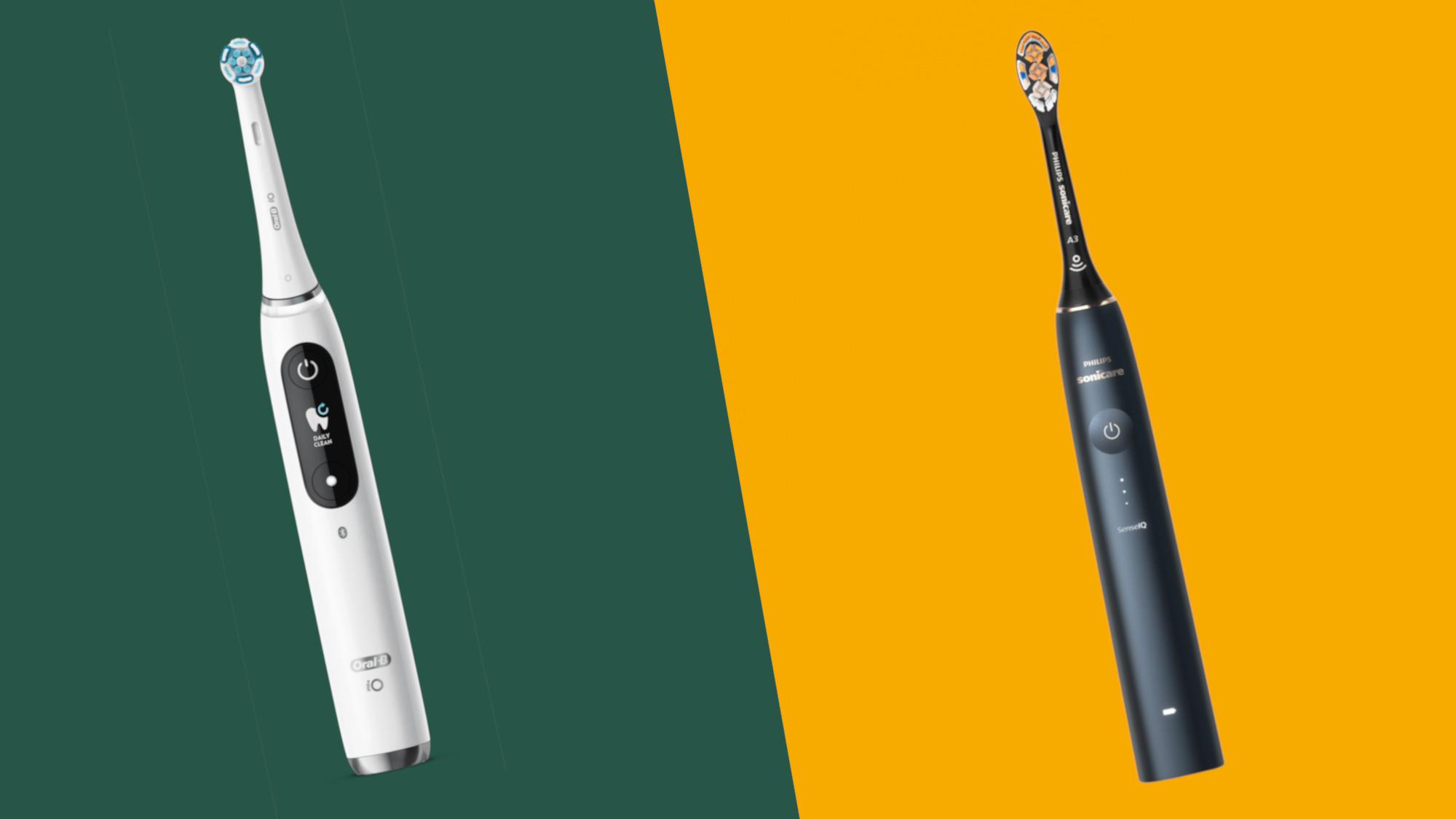
The Oral-B iO Series 9 (also known as the Oral-B iO9) and the Philips Sonicare 9900 Prestige are two of the best electric toothbrushes you can buy today, and we're here to help you work out which one is right for you.
When you're shopping for an electric toothbrush, the choice can be baffling – there are so many different models with seemingly very little difference between them, all for a similar price, it's tricky to know how to differentiate between them. That's where we come in. We've tested both these brushes ourselves over the course of several weeks, putting their mobile apps, different brushing modes, and speed options to the test, and using disclosing tablets to help assess their actual cleaning ability.
The Oral-B iO Series 9 and Philips Sonicare 9900 Prestige both ranked very highly in our tests, and both provide real-time feedback on your smartphone to help improve your brushing technique. They're similarly priced too, but there are some important differences to bear in mind.
If you have kids, the Oral-B iO Series 9 is the brush we'd choose. It has a bright display that provides feedback on your brushing even if you're not using the mobile app, and if you do connect the brush to a phone, youngsters can earn badges and awards for good, consistent habits.
The Philips Sonicare 9900 Prestige, on the other hand, is a more stylish and minimalist brush, with no settings options on the handle, but fine-grain control available in the mobile app. It's very light and comfortable to hold, with an equally well designed charger and travel case, and includes a sensor that warns you if you're using too much of a scrubbing action.
If you've decided which brush is right for you, we've rounded up the best deals on both right here. If not, read on to learn more about the pair.
Price and availability
- Sonicare 9900 Prestige usually slightly cheaper
- Both frequently discounted in sales events
Right now there isn't much price difference between these two brushes, but the cost fluctuates a lot at third-party stores like Amazon, and they're often steeply discounted during sales events like Amazon Prime Day and Black Friday.
Sign up for breaking news, reviews, opinion, top tech deals, and more.
The Oral-B iO Series 9 was released in 2020, and was originally priced at $300 / £500 / AU$400. Replacements heads cost around $35 / £30 / AU$35 for a set of two.
The Philips Sonicare 9900 Prestige launched in 2021, and originally carried a price tag of $399.99 / £299.99 (about AU$550). Replacements heads are about $32 / £30 / AU$45 for a two-pack.
Those prices, we think you'll agree, are pretty eye-watering. Thankfully electric toothbrushes drop in price rapidly after launch, and you can now pick up either one for much, much less. At the time of writing, you can grab the iO Series 9 for around $300 / £200 / AU$400, or the Sonicare 9900 Prestige for roughly $350 / £250 / AU$400.
Design
- Both have charging cases for travelling
- Philips brush has no setting controls on the handle
- Sonicare 9900 Prestige has more practical charging base
The Oral-B iO Series 9 and Philips Sonicare 9900 Prestige are both premium electric toothbrushes, with designs to match.
The Oral-B iO Series 9 has a sleek handle, and comes in three colors: black, white, and rose quartz. It has two buttons (one for power, and one to switch between modes) and a color LED display that makes it easy to change modes and receive feedback at the end of each brushing session.
One the iO Series 9's best features is its pressure sensor, which is connected to colored LEDs in the bottom of the handle. You can choose a default color for the light for a personal touch, and while you're brushing the color will shift to green if you're applying just the right amount of pressure, or red it you're pressing too hard. If it remains on your custom color, you're not pressing hard enough.
The brush comes with a magnetic charging base, which gathers less water residue than the typical design with a peg that fits into a hole in the bottom of the handle, though in our tests we found it easy to accidentally knock the brush off.
The iO Series 9 is supplied with a plastic travel case that protects the brush in transit, and doubles as a power bank to keep it charged on the road. It has space for the brush handle and one head.
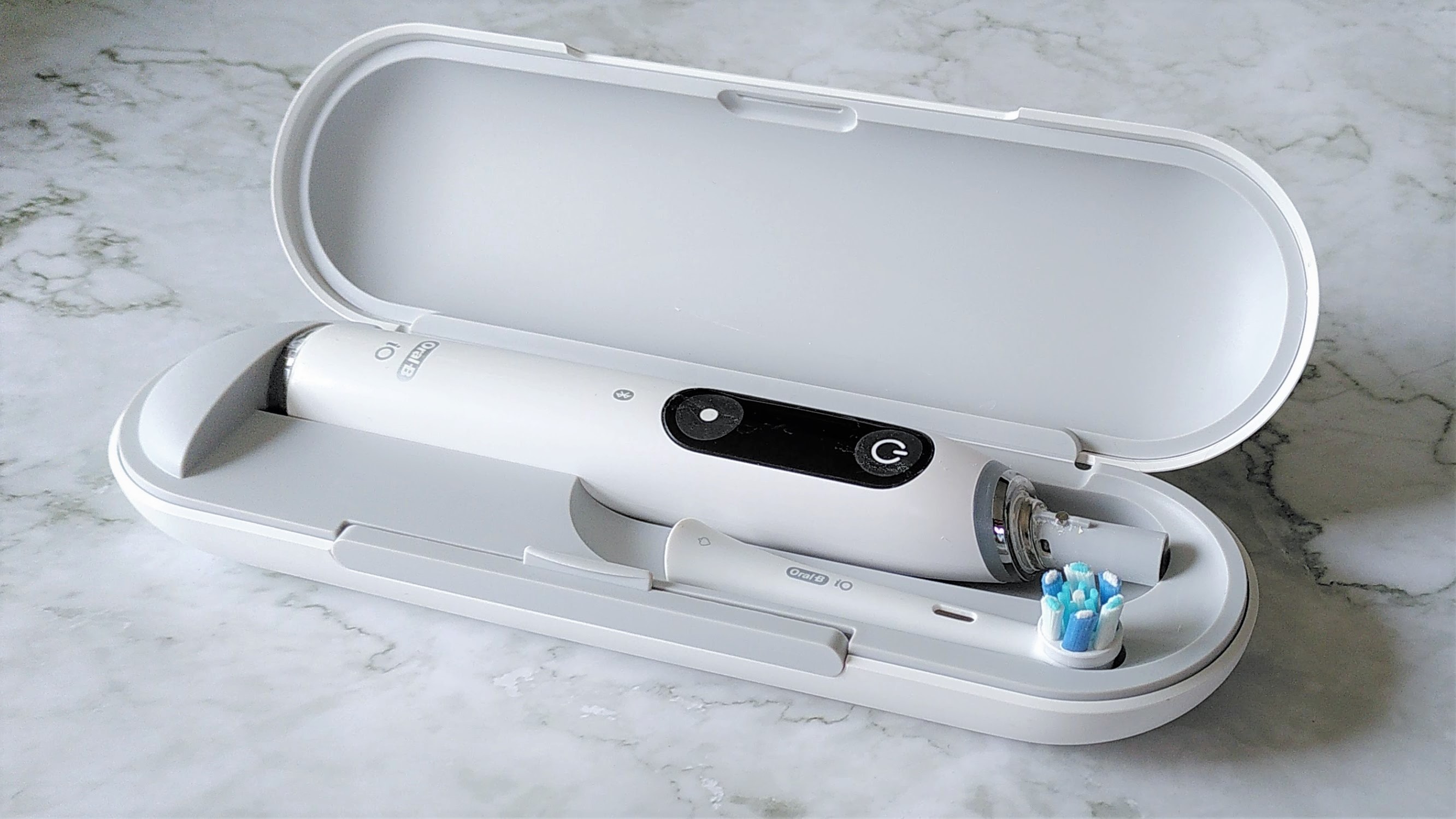
The Philips Sonicare 9900 Prestige feels similarly sleek and well balanced in the hand, and comes in two colors: champagne or midnight. It's particularly lightweight, making it easier to use if you experience stiffness in your hands, and uses compact, all-purpose brush heads so there's no need to choose between types and configurations of bristles.
The design of the handle is very streamlined, with just a power button and a single LED; there's no screen, and if you want to change brushing modes you'll have to dive into the Sonicare app on your phone. You can't change settings by tapping a button on the handle as you can with the Oral-B iO Series 9.
We particularly like the Sonicare 9900 Prestige's thoughtfully designed charger, which is essentially a metallic puck with a plastic cover that sits over the top and holds the brush in place. It looks smart, there's no risk of knocking the brush off as there is with the iO Series 9, and you can easily remove the plastic part for cleaning.
The brush's case is extremely smart looking too, with a leather-effect outer and gold-toned accents. If there's such a thing as an executive toothbrush, this is it.
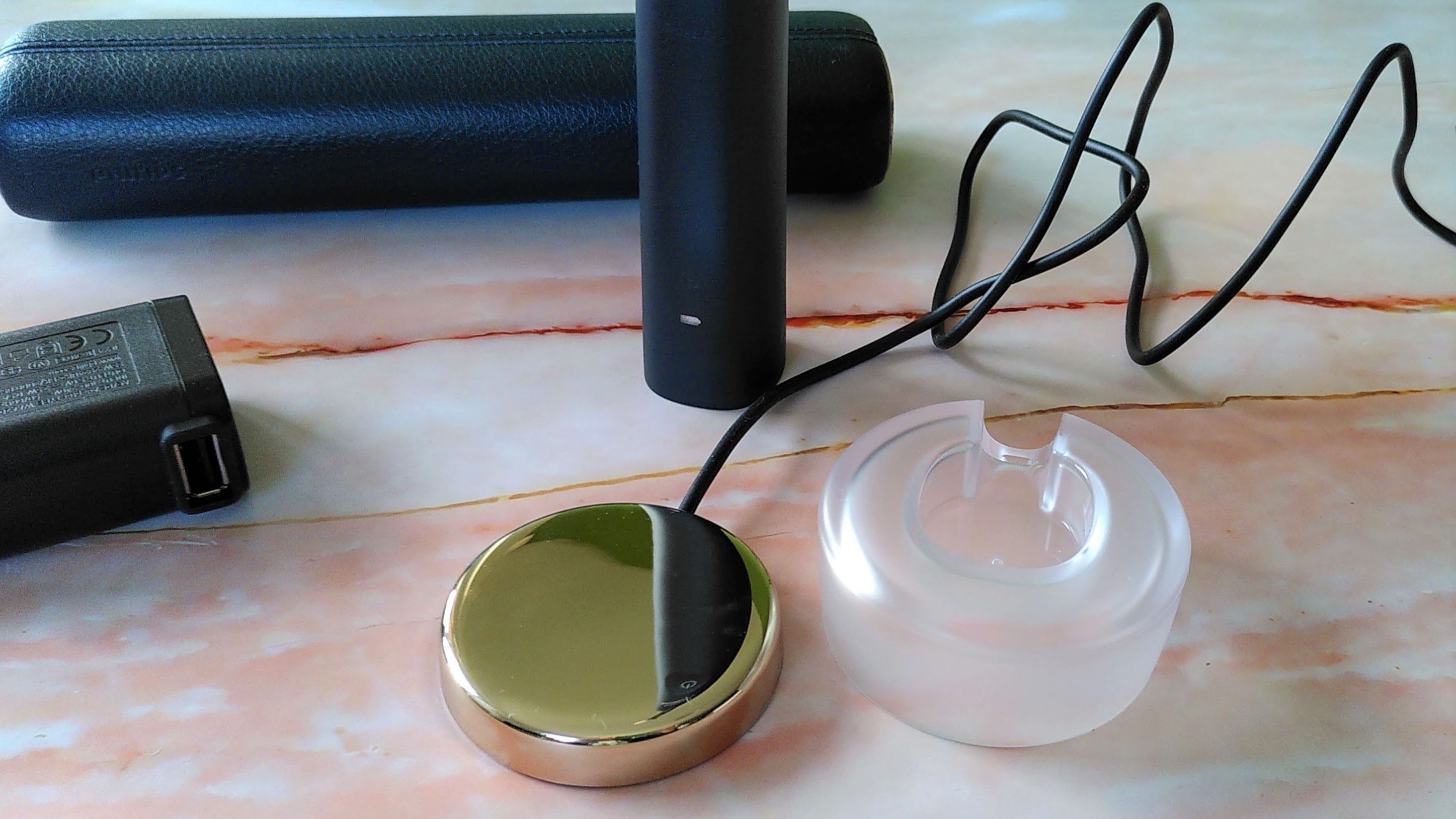
Features
- Both have Bluetooth connectivity
- Sonicare app gives you more brushing options
- Philips brush warns if you're scrubbing your teeth too much
- Sonicare is more user-friendly for kids
These toothbrushes both contain Bluetooth modules, allowing them to connect to your phone and transmit data from positional sensors to a mobile app. This gives you feedback on your brushing, which you can use to improve your technique.
The Oral-B app is very well designed, and can give you as much or as little feedback as you like. It's adaptive, too; if you have an advanced brush like the iO Series 9, you'll see a wider range of options and tools than if you have a more basic model.
You can choose to brush with or without the app. If you choose to use it, you'll see a diagram of a mouth divided into six sections. As you brush each part of your mouth, the teeth in that section will change color from blue to white, helping you see when you've covered all the surfaces. When you're done, you can add details such as whether you experienced any gum bleeding, and whether you flossed and/or used mouthwash.
The app will keep a log of your brushing sessions, and award you with virtual tokens for reaching certain goals (something that could help keep kids engaged).
If you choose not to use the app, you'll still receive real-time feedback from the brush's pressure sensor, and once you've finished brushing you'll get a mini performance report in the form of an emoji on the brush's screen. It might seem silly, but it's surprisingly motivating to earn a smiley face for your efforts.
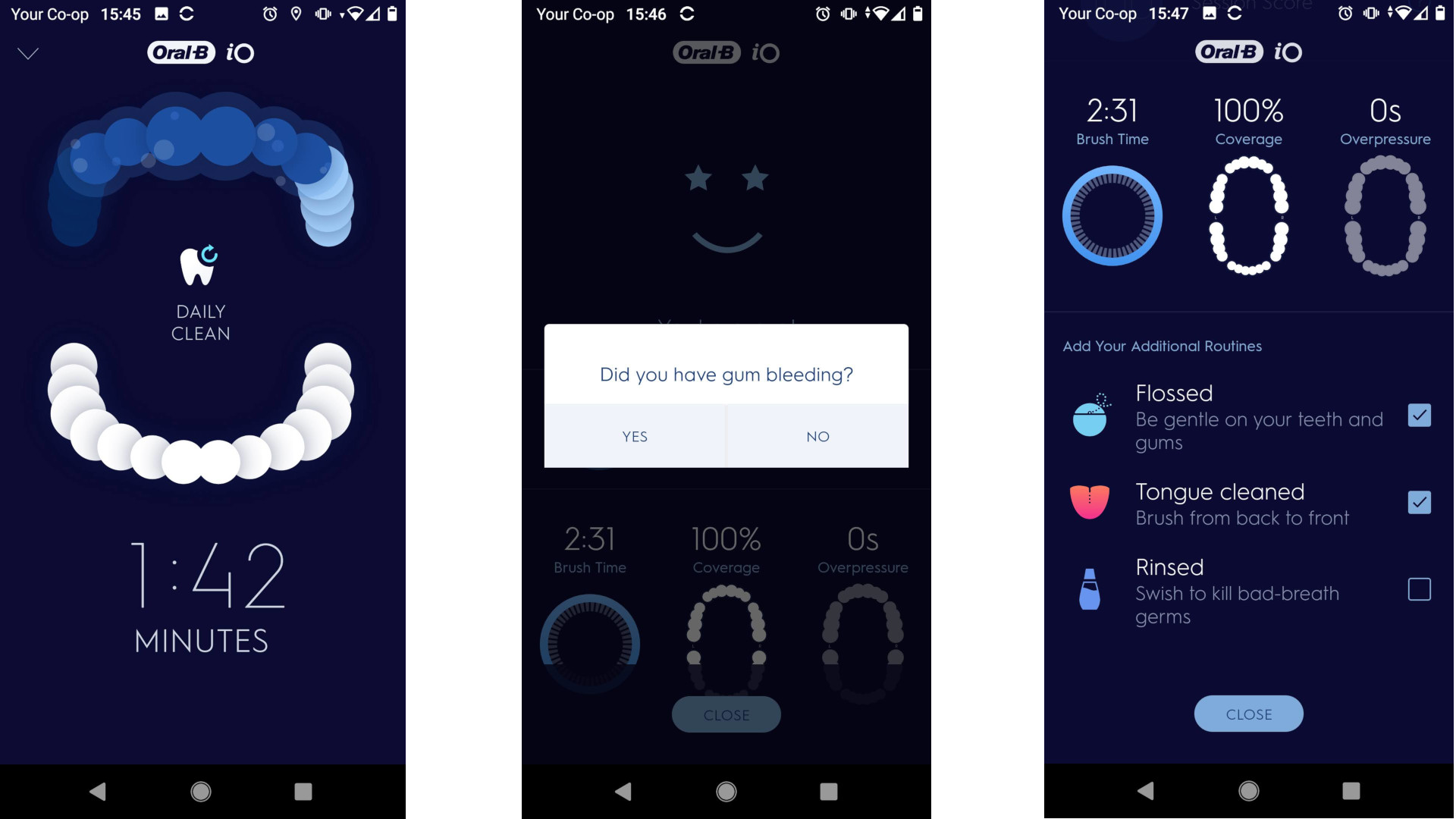
The Philips Sonicare 9900 Prestige is also easy to connect to your phone, but the app gives you finer control over brushing settings. Once you've set up the brush, you'll be able to change brushing mode and intensity separately, giving you a wealth of different options. We preferred the medium intensity in 'clean' mode, which gave a good clean while gliding smoothly over our teeth.
Like the Oral-B iO Series 9, the Sonicare 9900 Prestige contains a pressure sensor, and a light in the bottom of the brush handle that illuminates if you're overdoing it, but we found the Sonicare much less sensitive to changes in pressure. You had to press really quite hard before the brush illuminated and vibrated as a warning. There's also no alert if you're not pressing hard enough.
You do, however, get a helpful warning if you're using too much of a scrubbing action, which can also damage your gums.
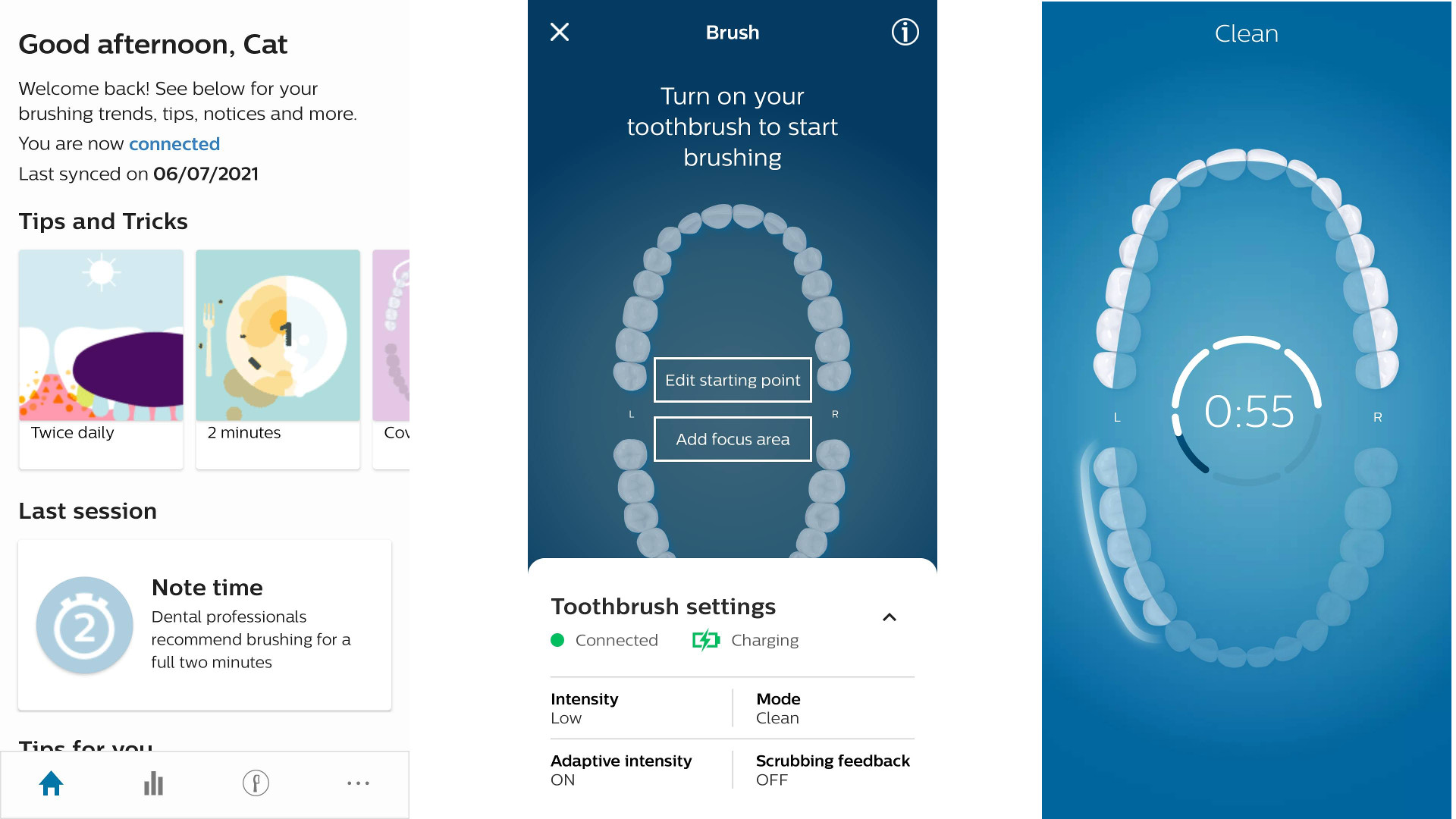
Like the Oral-B app, the Sonicare app presents you with a diagram of a mouth, with teeth that change color as you brush to ensure you get every surface. However, rather than allowing you to make your way around your mouth in your own time, the Sonicare app encourages you to stick to two minutes, warning you that it's time to move on with a series of vibrations. You can spend time tidying up afterwards if some of the the teeth in the diagram aren't white yet, but the experience does feel a little rushed.
There are no badges and awards to keep kids engaged, but the Sonicare app gives you custom brushing advice based on your past performance, which should help you improve your technique in the long run.

Cat is TechRadar's Homes Editor specializing in kitchen appliances and smart home technology. She's been a tech journalist for 15 years, having worked on print magazines including PC Plus and PC Format, and is a Speciality Coffee Association (SCA) certified barista. Whether you want to invest in some smart lights or pick up a new espresso machine, she's the right person to help.